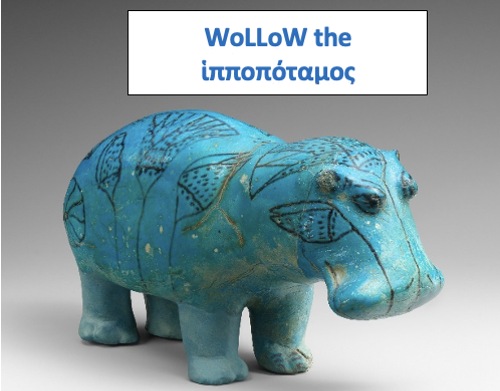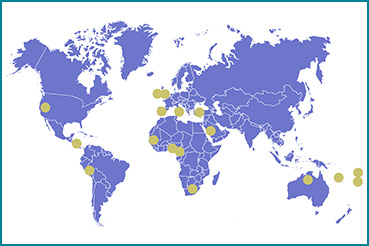
Linguistic Diversity Collective
The Linguistic Diversity Collective (LDC) is a group of academics in the Departments of Linguistics and English Language and Modern Languages and Cultures who research and champion linguistic diversity both locally and globally.
We work on a diverse range of languages and linguistic settings across the globe.
We study the languages’ morpho-syntactic and semantic make-up, and draw theoretical generalisations about the nature of language and cross-linguistic variation.
We document languages, study language use and acquisition in multilingual settings and contribute to language revitalisation and policy.
People
Learn about some of the experts from the Collective.
Professor Thea Cameron-Faulkner
I am a child language development researcher. My fieldwork takes place in the UK and the Republic of Ireland. Over the years I have worked on Irish language development and language development in heritage communities.
Professor Delia Bentley
My research explores the interplay of grammar with the meaning of words and the information provided by the context of linguistic interactions. I seek evidence in the Romance languages, particularly those which have little socio-political recognition. I conduct my fieldwork in villages of Italy, especially Sicily and Sardinia, and have frequently investigated the dialect spoken in Palermo.
Dr Martina Faller
I conduct fieldwork on Quechua with speakers in and around Cusco, Peru, exploring various aspects of the language. The aim of my work is to contribute to our understanding of how languages differ from each other and what they have in common, and to the development of linguistic theories that are informed by data from a variety of languages.
Dr Leonie Gaiser
I use linguistic ethnographic methods to explore multilingualism, language maintenance, language policy, language provisions and questions of identity in ‘superdiverse’ urban diaspora settings. My research focuses on Arabic and other so-called ‘heritage’ languages in Manchester, UK.
Dr Vera Hohaus
My research is on the building blocks of meaning in natural languages and how they vary. I have spent more than ten years working on Samoan, an Austronesian, Oceanic language spoken on the islands on the Samoan archipelago in the South Pacifc. Other languages that have more recently featured in my research include Afrikaans, Hijazi Arabic, and Turkish.
Dr Jens Hopperdietzel
I am conducting fieldwork on indigenous languages in the Pacific region, with a focus on Daakaka, an endangered language spoken by a small community in Vanuatu, and Samoan. Studying the grammar of these understudied languages, my research not only refines the language specific description, but also contributes to our knowledge about the variation found in the world’s languages.
Professor Andrew Koontz-Garboden
I research Misumalpan languages, especially Ulwa (Nicaragua), Basaá (Bantu; Cameroon), Huave (isolate; Oaxaca), Tongan, Spanish and Portuguese. My most detailed fieldwork has been in Karawala, Nicaragua, where I work on the relationship between word meaning and sentence structure.
Dr Serge Sagna
I conduct my research in the southwestern Senegal, on Gújjolaay Eegimaa, a language spoken in a former kingdom of 10 villages called Mof-Ávvi. I have done research on language documentation and description, child language acquisition and sociolinguistics, especially on multilingualism.
Professor Eva Schultze-Berndt
I have worked with some of the few remaining speakers of two – neighbouring but unrelated – languages of Northern Australia, Jaminjung-Ngaliwurru and Ngarinyman, since 1994, with the aim of creating a lasting documentation. I have described aspects of Jaminjung-Ngaliwurru and I have also worked on the grammar of Kriol, an English-lexified creole language spoken in the same region.
Dr Simone de Cia
My research investigates the relation between sentence structure and how information is organised in discourse to meet the speaker’s communicative goals. My focus is on lesser-known Romance languages spoken in north-eastern part of Italy, which include Friulian, Ladin and Venetan. I carry out my fieldwork in villages along the Venetian Prealps.
Dr Ryan Walter Smith
My research in semantics and syntax draws on elicitation with speakers of various Iranian languages, such as Persian, Ossetian, Balochi, and Kurdish, with an eye toward understanding how the grammar of these languages can inform our understanding of natural language syntax and semantics more generally. I also work on Japanese, and more recent work of mine has included Spanish as well.
Dr Nicholas Weise
I am a Senior Lecturer in the Department of Chemistry working with international biotechnology researchers and multilingual communities across Manchester to provide personal and relevant public engagement to underserved audiences. This comprises outreach in languages other than English to address gaps in aspiration and access to science education for bilingual young people in the region.
Dr Rebecca Tipton
Based in the department of Modern Languages and Cultures, I am a specialist in translation and interpreting studies with particular interest in the ways in which multilingualism is addressed by public services. My research focuses on the organisation and implementation of language support provisions in police, asylum and social work contexts, and on how insights from academic research can be translated into professional practice to enhance service delivery.
Dr Alex Baratta
I conduct research on linguistic prejudice in educational settings, notably accentism in British teaching, and students' use of World Englishes within assessment.
Dr Ablimit Baki Elterish
I am based in the Department of Modern Languages and Cultures, I am a native speaker of Uyghur, a Turkic language. I am specialised in Chinese sociolinguistics with particular interest in language situation (Uyghur and Chinese) in western China. My research focuses on language policy, language use, and linguistic landscape. More on me can be found here https://research.manchester.ac.uk/en/persons/ablimit.baki.elterish
Hazel Gardner
I am a Communications and Engagement Coordinator based within the Creative Manchester research platform. I provide organisational, public engagement and communications support to LDC and I have a background and interest in Linguistics.
News and activities
Keep up-to-date with the latest news from the Linguistic Diversity Collective.
- Festival of Libraries 2025 - Blackout the Jargon free workshop
- Festival of Libraries 2025 - What's in a Word, and What's in a Dictionary? free workshop
- Multilingual World podcast episode 7: En conversation avec Nicolas Quint sur les créoles
- International Mother Language Day 2025: 'Looking for Languages' trail at Manchester Museum, 21 Feb 2025
- International Mother Language Day 2025: 'Are all accents created equal?' talk at Manchester Museum, 21 Feb 2025
- Multilingual World podcast episode 6 (part 2): In conversation with Emeritus Professor Ayọ̀ Bámgbóṣé
- Multilingual World podcast episode 6 (part 1): In conversation with Emeritus Professor Ayọ̀ Bámgbóṣé
- Multilingual World podcast episode 5: The Languages of Italy, with Prof. Delia Bentley
- 14 June 2024: Blackout the Jargon - a free drop-in session at The Portico Library for Festival of Libraries 2024
- 12 June 2024: What's in a word and what's in a dictionary? Free workshop at The Portico Library for Festival of Libraries 2024
- 8 June 2024: LDC at the University of Manchester's Community Festival - find us in AMBS and at Manchester Museum
- International Mother Language Day 2024: 'The Language of Life' workshop at Manchester Museum, 21 Feb
- International Mother Language Day 2024: 'Looking for Languages' at Manchester Museum, 21 Feb
- Multilingual World podcast episode 4:Forensic Phonetics, with Prof. Dominic Watt
- Multilingual World podcast episode 3:Language maintenance and revitalisation, with Prof. Julia Sallabank
- Multilingual World podcast episode 2: Indigenous languages and revitalization, with Prof. Gabriela Pérez Báez
- 9 June 2023: 'What's in a word?' workshop for Festival of Libraries 2023
- 19 April 2023: Linguistic Diversity and Ethnobotanical Knowledge
- 12 April 2023: 'Looking for Languages' at Manchester Museum
- 'Multilingual World' podcast launches
- 22-24 February 2023 - LDC events for International Mother Language Day 2023
- Free to watch online: LDC panel discussion, 'Supporting Manchester's language communities: Language endangerment and maintenance'
- 19 October 2022 - LDC free panel discussion, 'Supporting Manchester's language communities: Language endangerment and maintenance'
- 14 July - Dr Leonie Gaiser presents at the Sociolinguistics Symposium 24
- 28 June - 1 July 2022: TripleAFLA conference took place, organised by LDC members
- 25 June 2022: LDC at the University’s Community Festival 2022
- 15 June 2022: Two LDC workshops took place at Manchester City of Literature’s Festival of Libraries
Resources
Get involved
The LDC are available to engage with local school pupils on the subject of linguistic diversity and to support and enrich the work of third sector organisations such as community groups and language schools.
If you’d like to discuss this, or for any other queries, contact us at LDC@manchester.ac.uk
For the latest LDC news, you can sign up to our mailing list
Connect
Connect with the Linguistic Diversity Collective wherever you are through our social media channels:
| Linguistic Diversity Collective |
LDC Partners

- The World of Languages and Languages of the World (WoLLoW) initiative

